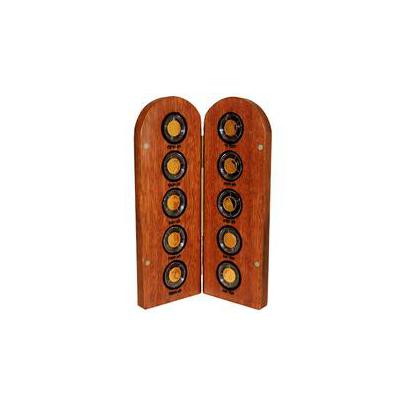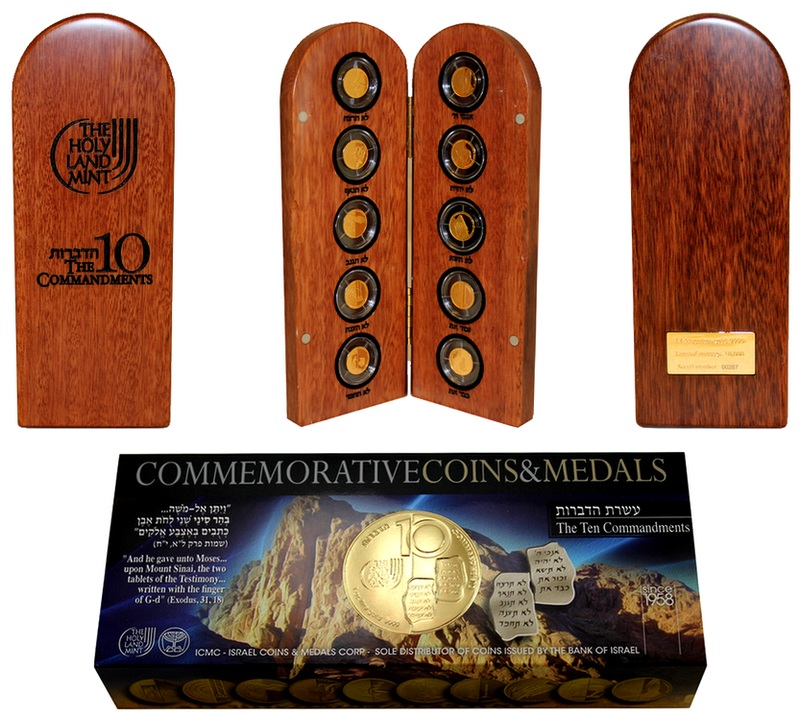Ten Commandments Set of 10 smallest gold medals Israel 2013 Proof
The product cannot be ordered now.
NOT IN STOCK
View the product
Detailed description
RAZITKO_POSTOVNE_ZDARMA_NENI
"The Ten Commandments" series
The world's very popular "The Ten Commandments" series, issued in Israel in 2013 exclusively as a set of ten gold (smallest) medals, minted by the Israel Mint (The Holy Land Mint) in top quality proof, is dedicated to the biblical Ten Commandments given by God to mankind. Each gold medal in this series is issued in 1/25 oz (1.244 g) and 999.9 purity of the purest gold.

Each medal artistically depicts one commandment from the Ten Commandments. The motif surrounds the commandments in English and Hebrew. The obverse of each medal displays the numeral "10", two plates of laws, the title "COMMANDMENTS" in English and Hebrew, the mint logo, weight and purity.
The medals are supplied in a wooden box in a limited edition of only 10,000 pieces for the whole world! The back of the box features a metal plate engraved with the weight, purity, limited mintage and serial number of the set.

Ten
The Decalogue, or Decalogue, is considered by Jews and Christians to be the commandments (precepts) that God - the Lord - gave to humans as a directive for a way of life. According to the Old Testament, God gave the two tablets of commandments at Mount Sinai into the hands of Moses. The commandments are listed twice in the Bible; the first time in the book of Exodus, the second time in the book of Deuteronomy.

The traditional interpretation is that the Law as it stands today, including the Ten Commandments, was received by Moses at Sinai. This is held by both orthodox Jews, the Talmud, and fundamentalist Christians.
Biblical criticism, on the other hand, distinguishes different temporal and traditional layers in the Bible, which admits a gradual and mosaic formation of the Bible, including the Ten Commandments. It assumes a very brief form for all the commandments, as in "Thou shalt not kill, thou shalt not commit adultery, thou shalt not steal" (G. v. Rad). In later commentaries and interpretations the two versions differ, and are therefore usually regarded as later additions. F. L. Hoßfeld and W. Johnstone are of the opinion that the whole of the Ten Commandments originated in or after the Babylonian captivity (about the 6th century B.C.). The influence of the Egyptian Book of the Dead may be probable, in the 125th chapter of which, concerning the judgment of the dead, we find at many other points several similarities to those of the Decalogue. The Egyptian Book of the Dead is undoubtedly older than the Bible itself.
According to H. Greßmann and E. Jenni, the core of it dates back to the time of Moses (14th-13th centuries). According to L. Perlitt it dates from the end of the 7th century, J. Wellhausen dates it from the 8th century, etc. The clue is primarily the assumption that the person addressed is a man, a free peasant, married, father of children, son of grandparents, owner of a farm and slaves - a social status to which the (nomadic) Jews developed only in later times. In the emphasis on the Sabbath is again seen the influence of religious life in the Temple period and after the Babylonian captivity. In the emphasis on the oneness of God and in the prohibition against the representation of God is seen a polemic against Babylonian paganism, which may have been seductive to the exiles.
Product Specifications
Application form
Thanks to our position on the market, we can try to provide you with a product that is currently sold out or unavailable for a longer period of time. Simply fill in the application form and we will contact you as soon as we are able to secure the product.
Filling in the application form is not binding for you.
Buyback contact form
We will be happy to buy investment metals purchased from us or from our competitors. Our customers always get the highest price offered at any given time. Fill out the form below and we will contact you. Thank you for your trust.




